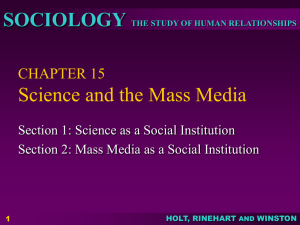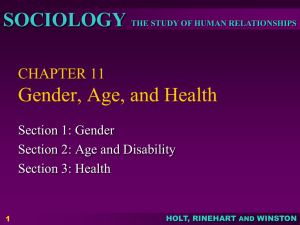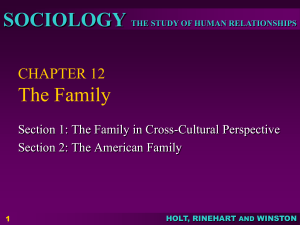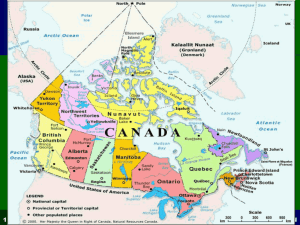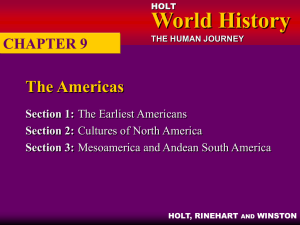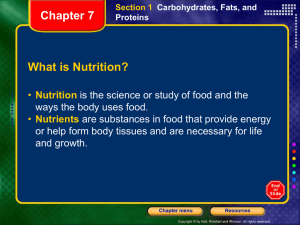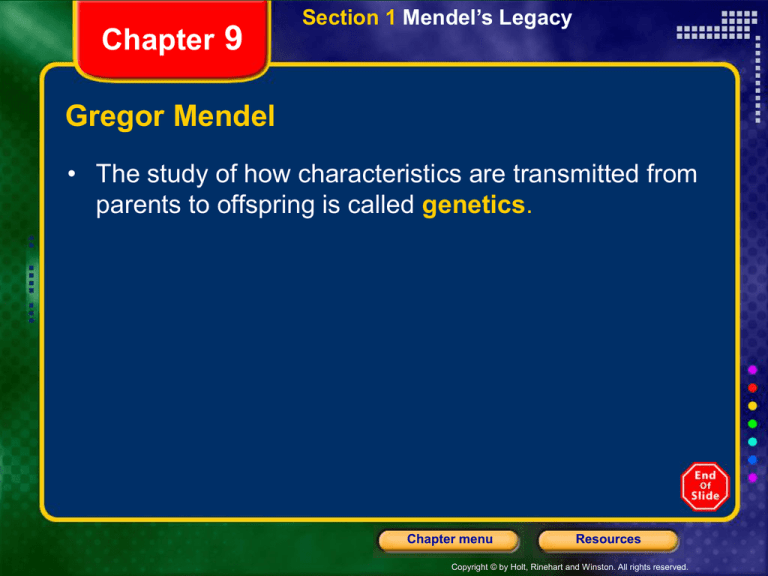
Chapter 9
Section 1 Mendel’s Legacy
Gregor Mendel
• The study of how characteristics are transmitted from
parents to offspring is called genetics.
Chapter menu
Resources
Copyright © by Holt, Rinehart and Winston. All rights reserved.
Chapter 9
Section 1 Mendel’s Legacy
Gregor Mendel, continued
• Mendel’s Methods
– Mendel used cross-pollination - pollen is
transferred between flowers of two different plants.
Chapter menu
Resources
Copyright © by Holt, Rinehart and Winston. All rights reserved.
Chapter 9
Section 1 Mendel’s Legacy
Mendel’s Results and Conclusions
• Recessive and Dominant Traits
– Inherited characteristics are controlled by pairs of
genes.
– One factor in a pair masked the other.
• The trait that masked the other was called the
dominant trait.
• The trait that was masked was called the
recessive trait.
Chapter menu
Resources
Copyright © by Holt, Rinehart and Winston. All rights reserved.
Heterozygous and Homozygous
• Homozygous - the individual has two of the same
alleles.
– Can have two dominant traits (YY) or two
recessive traits (yy)
• Heterozygous – the individual has one dominant and
one recessive allele.
Chapter menu
Resources
Copyright © by Holt, Rinehart and Winston. All rights reserved.
Chapter 9
Section 1 Mendel’s Legacy
Support for Mendel’s Conclusions
• Alleles - alternative forms of a gene.
• One allele for each trait is passed from each parent
to the offspring.
Chapter menu
Resources
Copyright © by Holt, Rinehart and Winston. All rights reserved.
Chapter 9
Section 1 Mendel’s Legacy
Mendel’s Results and Conclusions, continued
• The Law of Segregation
– The law of segregation states that a pair of
factors is separated during the formation of
gametes.
• Each sex cell has half of the genes that control
a trait.
Chapter menu
Resources
Copyright © by Holt, Rinehart and Winston. All rights reserved.
Chapter 9
Section 1 Mendel’s Legacy
Mendel’s Results and Conclusions, continued
• The Law of Independent Assortment
– The law of independent assortment states that
genes are distributed to gametes independent of
one another.
• Only for genes on separate chromosomes.
• Ex: hair color and eye color aren’t “partnered
up”
Chapter menu
Resources
Copyright © by Holt, Rinehart and Winston. All rights reserved.
Chapter 9
Section 2 Genetic Crosses
Genotype and Phenotype
• The genotype is the genetic makeup of an organism.
•
The phenotype is the appearance of an organism.
Chapter menu
Resources
Copyright © by Holt, Rinehart and Winston. All rights reserved.
Chapter 9
Section 2 Genetic Crosses
Probability
• Probability is the likelihood that a specific event will
occur.
• A probability may be expressed as a decimal, a
percentage, or a fraction.
Chapter menu
Resources
Copyright © by Holt, Rinehart and Winston. All rights reserved.
Chapter 9
Section 2 Genetic Crosses
Predicting Results of Monohybrid Crosses
• A Punnett square can be used to predict the
outcome of genetic crosses.
• A cross in which one characteristic is tracked is a
monohybrid cross.
Chapter menu
Resources
Copyright © by Holt, Rinehart and Winston. All rights reserved.
Chapter 9
Section 2 Genetic Crosses
Predicting Results of Monohybrid Crosses, continued
• A testcross can be used when the phenotype
expresses the dominant trait.
• The tested organism could be YY or Yy
• It is crossed with a known recessive, yy
• If all offspring show the dominant trait, the tested
organism is YY.
• If a few offspring show recessive traits, the tested
organism is Yy
Chapter menu
Resources
Copyright © by Holt, Rinehart and Winston. All rights reserved.
Chapter 9
Section 2 Genetic Crosses
Predicting Results of Monohybrid Crosses, continued
• Complete dominance occurs when heterozygous
and dominant homozygous look the same.
• YY and Yy look alike.
• Eye color
Chapter menu
Resources
Copyright © by Holt, Rinehart and Winston. All rights reserved.
Chapter 9
Section 2 Genetic Crosses
Predicting Results of Monohybrid Crosses, continued
• Incomplete dominance occurs when two or more
alleles influence the phenotype and results are
between the dominant trait and the recessive trait.
• A white rose and a red rose make a pink rose.
Chapter menu
Resources
Copyright © by Holt, Rinehart and Winston. All rights reserved.
Chapter 9
Section 2 Genetic Crosses
Predicting Results of Monohybrid Crosses, continued
• Codominance occurs when both alleles for a gene
are expressed in a heterozygous offspring.
• Blood type; a person with type AB has an A allele
and a B allele.
Chapter menu
Resources
Copyright © by Holt, Rinehart and Winston. All rights reserved.
Chapter 9
Section 2 Genetic Crosses
Predicting Results of Dihybrid Crosses
• A cross in which two characteristics are tracked is a
dihybrid cross.
Chapter menu
Resources
Copyright © by Holt, Rinehart and Winston. All rights reserved.




